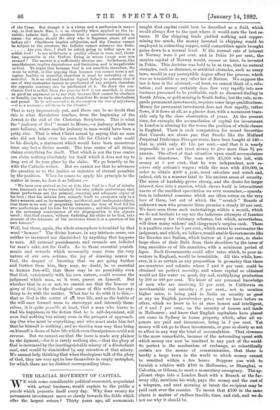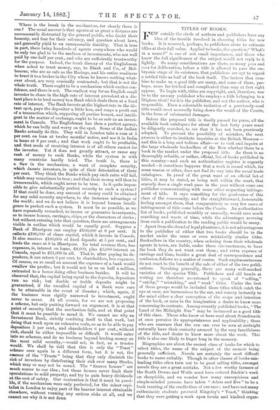THE GLACIAL MOVEMENT OF CAPITAL.
WE wish some considerable political economist, acquainted with actual business, would explain to the public a puzzle which presents itself every day. Why does money for permanent investment move so slowly towards the fields which offer the largest return P Thirty years ago, all economists taught that capital could best be described as a fluid, which would always flow to the spot where it would earn the best re- turns. If the shipping trade yielded nothing and copper- mining too much, the money invested in shipping would be employed in extracting copper, until competition again brought gains down to a normal level. If the normal rate of interest in Norway were 3 per cent. and in Pekin 10 per cent., the surplus capital of Norway would, sooner or later, be invested in Pekin. This doctrine was held to be so true, that no natural obstacles, such as distance, or artificial obstacles, such as usury laws, would in any perceptible degree affect the process, which was as irresistible as any other law of Nature. We suppose the law is true in the abstract,—at least, we cannot think of a refu- tation ; and money certainly does flow very rapidly into new business presumed to be profitable, such as diamond-finding in South Africa, or gold-mining in South India ; but the rule, as re- gards permanent investments, requires some large qualifications. Money for permanent investment does not flow rapidly, rather flows, if it flows at all, as a glacier does, with a movement trace- able only by the close observation of years. At the present time, for example, the accumulation of capital for investment in London is altering for the worse the pokion of whole classes in England. There is such competition for sound Securities that Consols are above par, that Stocks like the Midland Perpetual Preference Five-per-cents. have been bought at 140— that is, yield only £3 12s. per cent.—and that it is nearly impossible to put out trust money to give more than 81 per annum. The effect of that situation upon small accumulators is most disastrous. The man with £5,000 who felt, with money at 5 per cent., that he was independent, now re- ceives only artisan's wages ; while the man with £10,000, in order to obtain £400 a year, must calculate and watch and, indeed, risk in a manner fatal to his ancient sense of security. The sense of hardship grows strong, and the desire for larger interest rises into a passion, which shows itself in intermittent bursts of the maddest speculation we ever remember,—specula- tion in industrial concerns which are often rotten on the very face of them, but out of which the " scratch " Boards of unknown men who promote them promise a steady 20 per cent. We have seen three such undertakings within a month, which we do not hesitate t o say are the ludicrous attempts of fanatics to get money for visionary schemes, but which, nevertheless, will draw many widows' and clergymen's surplus cash. There is a positive crave for 5 per cent., which seems to overmaster the judgment, and which, we believe, would enable Governments like the Russian and Italian, which borrow at 5 per cent., to shake large slices of their Debt from their shoulders by the issue of long annuities or of life annuities, with a minimum period of lapse. Such Governments could offer rates which, to poor in- vestors in England, would be irresistible. All this while, how- ever, it is as certain as any proposition in geometry that there are countries and colonies where 7 and 8 per cent. could be obtained on perfect security, and where capital so obtained would act like water on good, dry soil, multiplying production by 300 or 400 per cent. We know of our personal knowledge of men who are receiving 15 per cent. in California on merchantable real security ; 8 per cent., not to mention higher rates, is being paid in India on security as good as any an English pawnbroker gets ; and we have before us offers, which we know to be at once honest and intelligent, of 6 and 7 per cent., on the security of houses and lands in Melbourne; and know that English capitalists have placed out sums in Sydney in house property which, after all ex- penses are paid and insurances, bring in 7 per cent. Yet money will not go to these investments, or goes so slowly as not to affect in any way the total of accumulation. That slowness is the more remarkable, because of the astounding speed with which money can now be remitted to any part of the world. So perfect is the mechanism of exchange, so scientifically certain are the means of communication, that there is hardly a large town in the world to which money cannel be remitted within a few hours. Suppose you wish to furnish a relative with £100 in Melbourne, or Shanghai, or Calcutta, or Odessa, to meet a momentary emergency. The ap- plicant steps into a London Bank with a Branch at the far- away city, mentions his wish, pays the money and the cost of a telegram, and next morning at latest the recipient may be paid cash over the counter. To invest that £100 in the same places is matter of endless trouble, time, and risk, and we do not see why it should be. Where is the break in the mechanism, for clearly there is one P The usual answer is that agents at so great a distance are unreasonably distrusted by the general public, who doubt their honesty, and fear for their solvency, and question about laws, and generally yield to an unreasonable timidity. That is true in part, there being hundreds of agents everywhere who would be only too glad to be the medium of investments, who are well paid by one-half per cent., and who are sufficiently trustworthy for the purpose. Indeed, the frank dismay of the Englishman when asked to trust money, say, to Blank and Co., of Mel- bourne, who are as safe as the Borings, and his entire readiness to trust it to a broker in the City whom he knows nothing what- ever about, are very comically contrasted ; but that is not the whole truth. There ought to be a mechanism which excites con- fidence, and there is not, The readiest way for an English small investor to share in the high rate of interest prevalent at a dis- tant place is to lend money to a Bank which deals there at a fixed rate of interest. The Bank invests at the highest rate in the dis- tant spot, pays the depositor a little less, and reaps a profit out of a transaction which, supposing all parties honest, and intelli- gent in the matter of exchange, ought to be as safe as an invest- ment in Consols. The Englishman has then a perfect agency, which he can bully and worry on the spot. Some of the Indian Banks actually do this. They will in London take a sum at 5 per cent. on loan at twelve months' notice, and use it in India in loans at 8 per cent.; and that work ought to be profitable, and that mode of receiving interest is of all others easiest for the investor. Yet it does not greatly attract, or cause any rash of money to such Banks, while the system is with many countries hardly tried. The truth is, there is a flaw in the mechanism, a want of complete security, which daunts investors, in spite of their detestation of three - per cent. They think the Banks which pay such rates will fail, which may sometimes be true ; and that their money will then be irrecoverable, which ought never to be true. Is it quite impos- sible to give substantially perfect security to such a system P If that could be done, any amount of money could be obtained for any solid security anywhere, to the immense advantage of the world ; and we do not believe it is beyond human intelli- gence to perfect such a system. It must be as possible, as we have repeatedly remarked, to insure or guarantee investments, as to insure houses, carriages, ships, or the characters of clerks ; but without entering into that question, there are arrangements visible in outline which would be equally good. Suppose a Bank of Bhurtpore can employ £100,000 at 8 per cent. It collects £100,000 of share capital, which it invests in Consols. It also receives £100,000 of fixed deposits at 5 per cent., and lends the same at 8 in Bhurtpore. Its total revenue then, less expenses, is, interest on loans, £8,000, plus £3,000 interest on Consols, equal to £11,000 in all. That is, after paying its de- positors, it can return 6 per cent. to shareholders, less expenses. Of eourse, on so small an amount the expenses of a bank would swallow the profits ; but it would not be so on half a million, entrusted to a house doing other business besides. It will be observed that, the capital being equal to the deposits, depositors run no risk; but double or treble deposits might be guaranteed, if the uncalled capital of a Bank were sure to be attainable in the event of disaster ; which, again, if the business were rigidly narrowed to investment, ought never to occur. At all events, for we are not proposing a scheme, but only putting forward an argument, it is at that point of security that the mechanism fails, and at that point that it must be possible to mend it. We cannot see why an Investment Bank, strictly confining itself to that work, but doing that work upon an extensive scale, so as to be able to pay depositors 5 per cent., and shareholders 6 per cent., without risk, should be either impossible or difficult. It would enter into no schemes, and do no business beyond lending money on the most solid security,—would act, in fact, as a trustee would. We shall be told that this is only the " Trust " scheme over again in a different form, but it is not, the essence of the " Trusts " being that they only diminish the risk of investors by distributing their risk over many Stocks, which may or may not be sound. The " finance houses" are much nearer to our idea ; but those houses never limit their speculations to solid property, and try to gain heavy dividends at the cost of safety. Our contention is that it must be possi- ble, if the mechanism were only perfected, for the minor capi- talist in London to enjoy part of the heavier interest obtainable elsewhere, without running any serious risks at all, and we cannot see why it is not done.







































 Previous page
Previous page